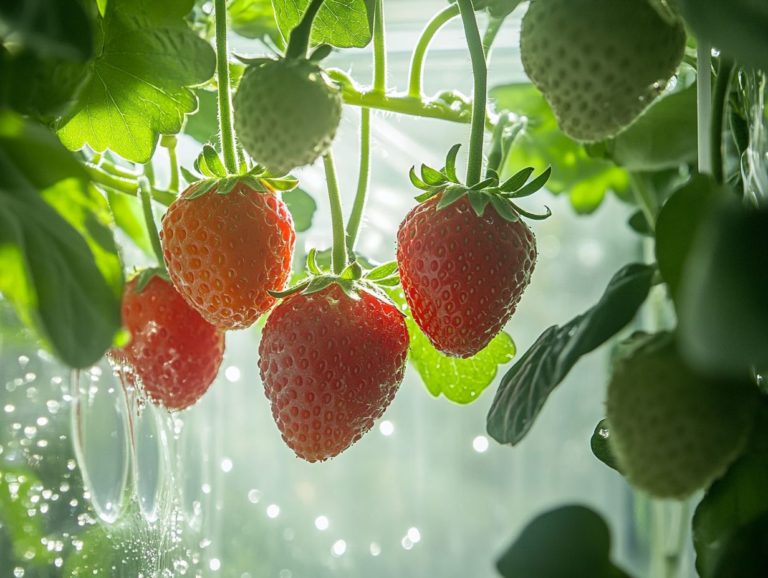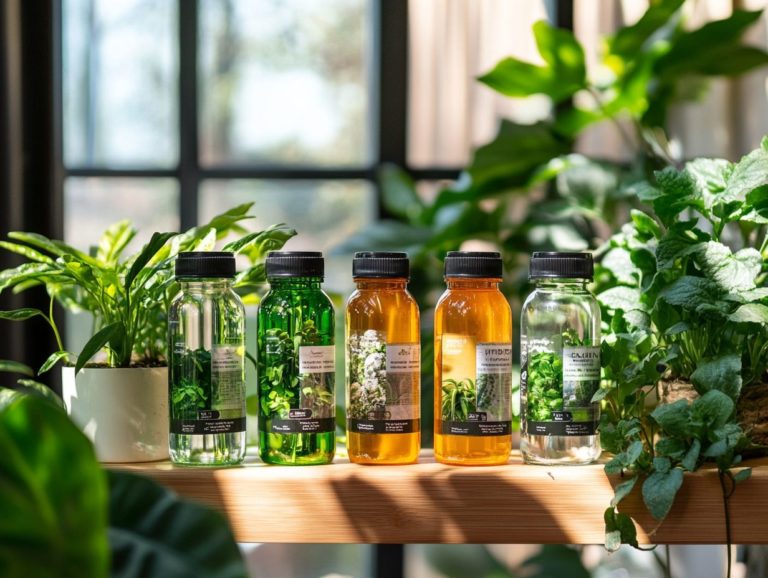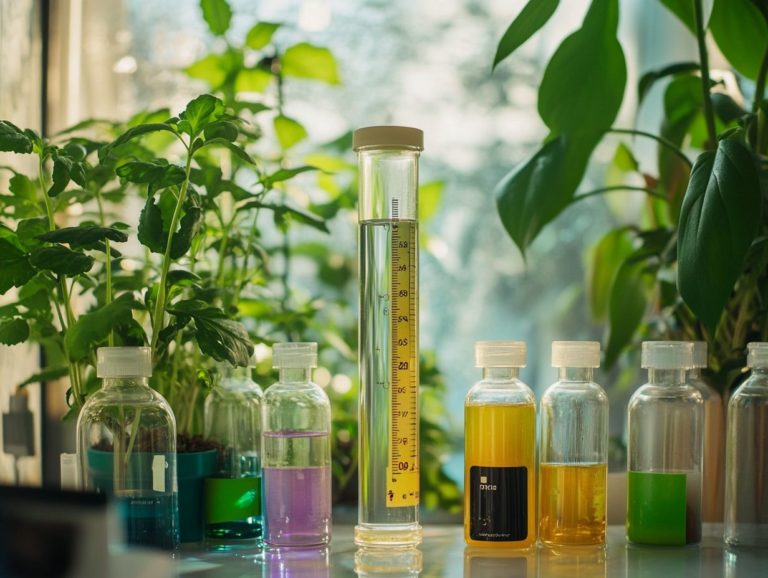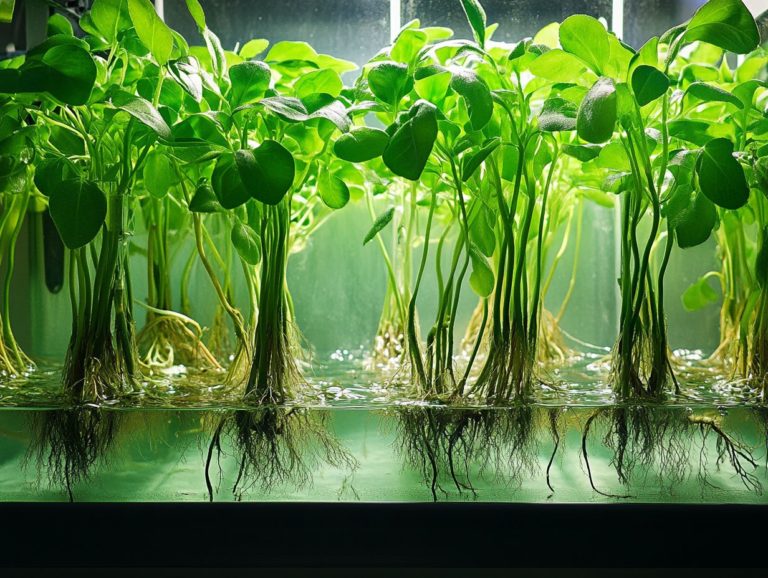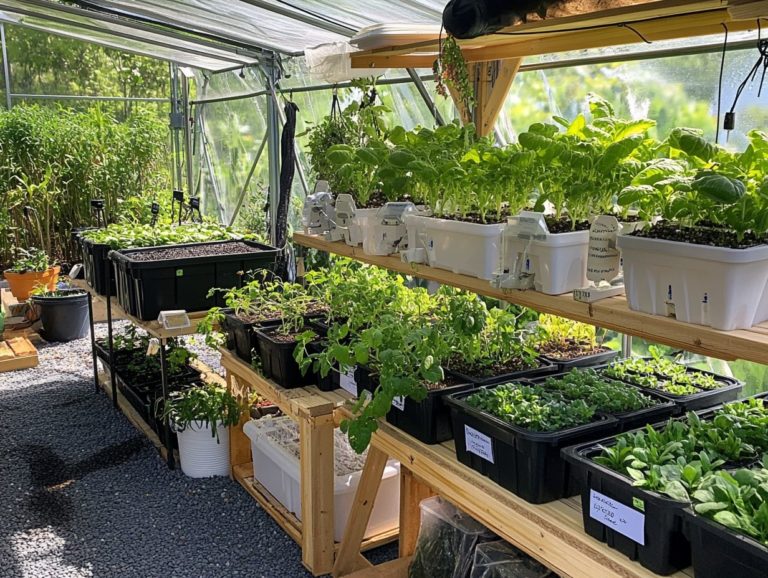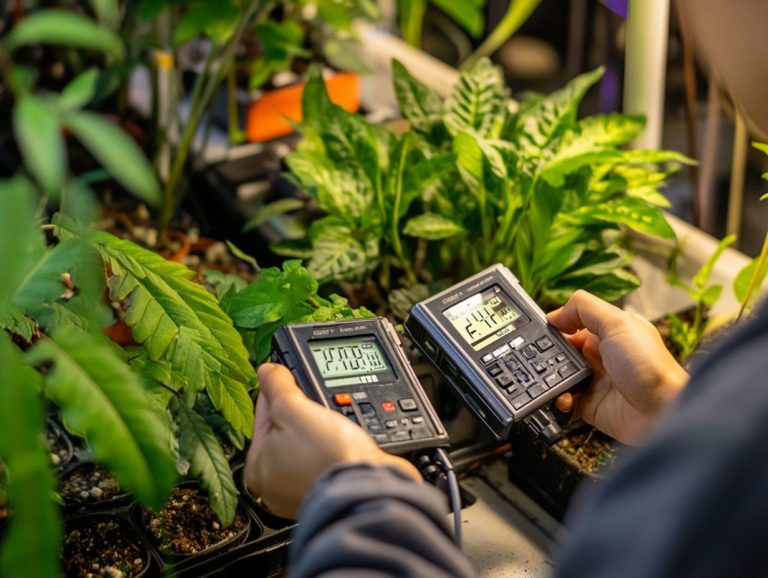Hydroponic Nutrients: Organic vs. Synthetic
Hydroponic gardening has surged in popularity, offering a soil-less method to cultivate plants, including cannabis, with remarkable precision and efficiency.
At the core of this innovative approach is the vital role of hydroponic nutrients, essential for nurturing healthy plant growth in various setups. This article explores the two primary categories of these nutrients: organic and synthetic.
You’ll discover their natural sources, advantages, challenges, and the pros and cons of each type, along with guidance on selecting the right nutrients for your system.
You ll also find tips for managing nutrients effectively to maximize your garden s potential. Whether you re a seasoned grower or just starting your hydroponic journey, understanding hydroponic nutrients is crucial for achieving thriving cannabis plants and a bountiful harvest.
Contents
- Key Takeaways:
- Organic Hydroponic Nutrients
- Synthetic Hydroponic Nutrients
- Choosing the Right Nutrients for Your Hydroponic System
- Tips for Proper Nutrient Management
- Frequently Asked Questions
- What are hydroponic nutrients and why are they important?
- What is the difference between organic and synthetic hydroponic nutrients?
- Which is better for hydroponic systems – organic or synthetic nutrients?
- Are organic hydroponic nutrients more expensive than synthetic ones?
- Can I use both organic and synthetic hydroponic nutrients in my system?
- Are there any specific plants that do better with organic or synthetic nutrients?
Key Takeaways:
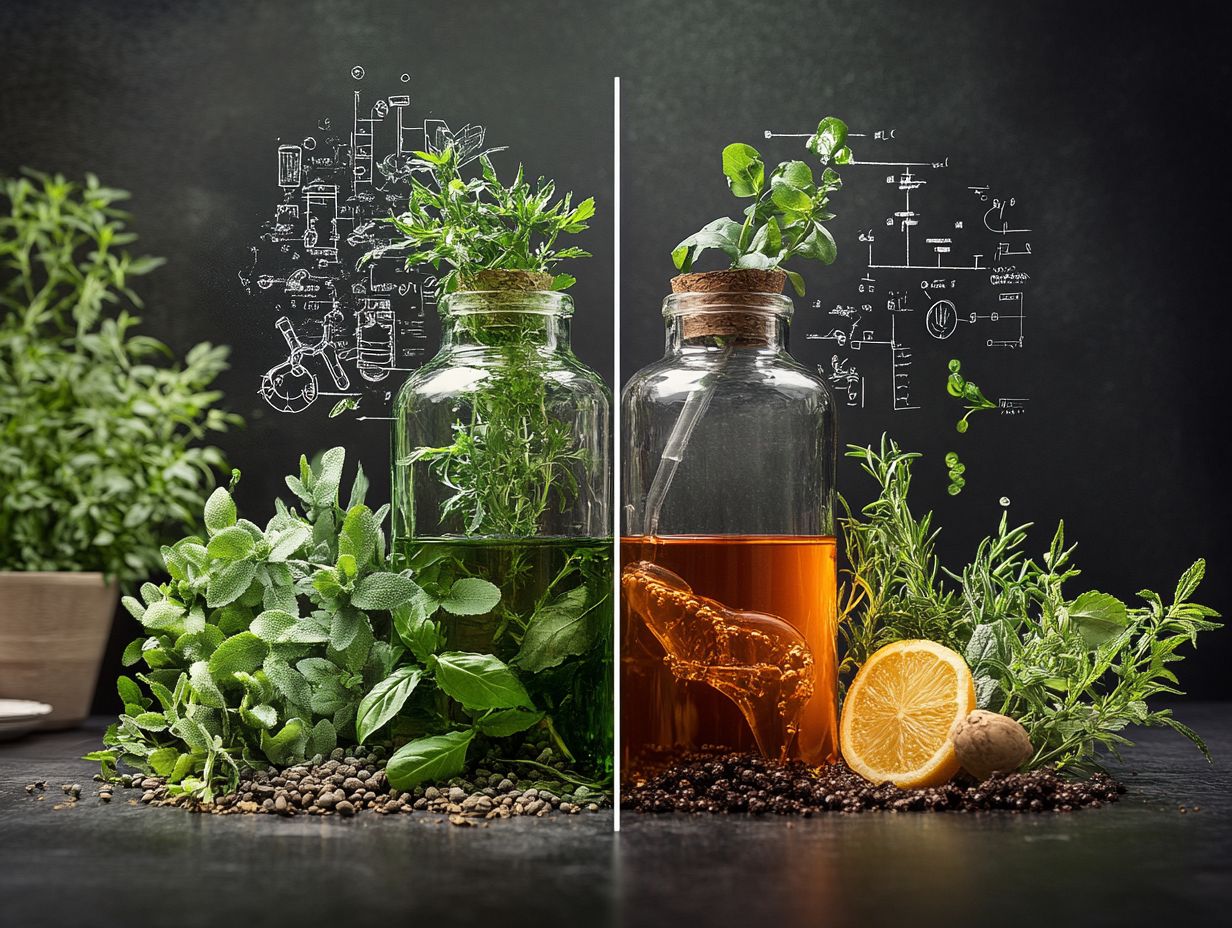
- Organic hydroponic nutrients come from natural sources and offer benefits like improved soil health and nutrient absorption, but also have limitations such as potential nutrient deficiencies and the need for careful timing to avoid nutrient burn.
- Synthetic hydroponic nutrients are chemically composed and have advantages like immediate nutrient availability, but also carry risks such as nutrient burn and build-up if not managed properly.
- When choosing nutrients for your hydroponic system, consider factors like plant type, growth stage, and water quality, and follow best practices for optimal growth.
What are Hydroponic Nutrients?
Hydroponic nutrients are fundamental for successful cannabis cultivation, supplying vital elements needed for growth in a soilless environment. Typically, these nutrients come as expertly formulated solutions that deliver both macro nutrients needed in larger amounts and micro nutrients required in smaller amounts tailored to meet the specific needs of your plants at various growth stages.
Unlike traditional soil setups, hydroponics relies on ways to manage nutrients to ensure optimal availability and absorption, which is essential for maximizing plant growth and overall health.
In your hydroponic adventure, the nutrient ratios are carefully balanced to promote robust vegetative and flowering phases. This method offers better control than traditional soil cultivation, where nutrients occur naturally and are less manageable.
Maintaining proper pH levels ideally between 5.5 and 6.5 is crucial for efficient nutrient uptake and can greatly affect the vitality of your cannabis plants.
You ll likely use pH meters to adjust your solutions as needed, ensuring you avoid deficiencies or toxicities. Managing nutrient solutions requires regular monitoring and adjustments since factors like water temperature and plant size can influence nutrient needs. This diligent approach ensures that your cannabis thrives beautifully throughout its growth cycle.
Organic Hydroponic Nutrients
Organic hydroponic nutrients, sourced from nature, are essential for cultivating healthy cannabis. They significantly enhance soil health and improve nutrient absorption, creating conditions favorable for robust plant growth.
Enriched with beneficial microorganisms, these organic fertilizers contribute to a vibrant living soil ecosystem that combats nutrient deficiencies. By choosing these nutrients, you align your cultivation practices with an environmentally sustainable approach, benefiting both your plants and the planet.
Natural Sources and Benefits
Natural sources of organic nutrients for hydroponics, such as compost, seaweed, and various organic matter, significantly enhance soil health and boost the nutritional content available to your cannabis plants. By incorporating these substances into your system, you provide essential macro and micronutrients while nurturing beneficial microorganisms that promote plant growth and strengthen resilience against deficiencies.
Integrating compost into your hydroponic setup is an excellent way to improve the nutrient profile. It releases a wealth of vitamins and minerals into the water, ensuring your crops receive a balanced diet. Seaweed extract, packed with natural growth hormones, stimulates root development and enhances plant metabolism, paving the way for robust growth.
Consider techniques like worm composting or bokashi. These methods are particularly effective for hydroponic growers. They create nutrient-dense mediums that maximize availability while cultivating a thriving microbial community. These practices boost nutrient uptake in your plants and foster a resilient growing environment.
Challenges and Limitations
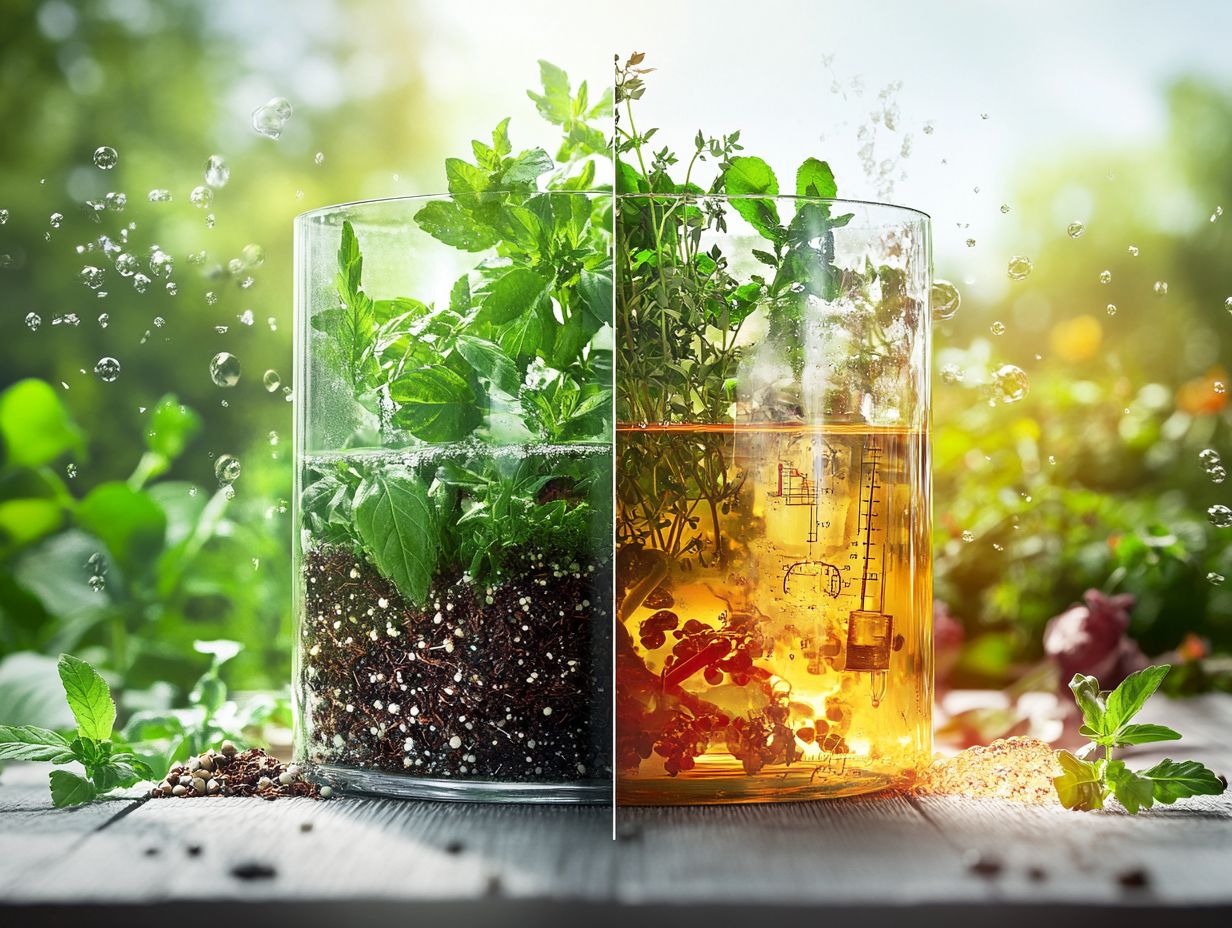
While organic hydroponic nutrients offer numerous advantages for cannabis cultivation, they come with challenges and limitations that you must navigate. Nutrient deficiencies may arise if your management isn’t balanced, leading to less-than-ideal plant health.
There s also a risk of nutrient burn if your solutions aren t formulated correctly. Without proper monitoring, nutrient build-up (excess nutrients in the system) can become a problem in hydroponic systems.
These hurdles can be daunting, especially for newcomers to organic practices. Continuous monitoring is crucial, as slight fluctuations in pH (a measure of acidity or alkalinity) and nutrient levels can dramatically affect your crop yields and quality.
Regular adjustments to your nutrient management system help you overcome these challenges while promoting a more sustainable growing environment. Act now to prioritize careful observation and timely interventions. This ensures your plants receive the optimal nutrients they need while minimizing negative environmental impacts from improper nutrient use.
Synthetic Hydroponic Nutrients
Synthetic hydroponic nutrients are carefully made to offer targeted nutritional support for cannabis plants, enabling precise nutrient management and optimal growth.
These nutrient solutions deliver essential macro and micronutrients in specific ratios, ensuring your cannabis plants receive what they require at each growth stage.
By utilizing synthetic nutrients, you can effectively control pH levels and timing, ultimately enhancing both the yield and quality of your crop.
Chemical Composition and Advantages
The chemical composition of synthetic hydroponic nutrients is specifically formulated to meet the needs of cannabis plants, ensuring efficient nutrient absorption and robust growth. These solutions typically feature a balanced blend of essential macro and micronutrients that are readily available for root uptake, promoting rapid growth and impressive yields in a controlled environment.
Key components like nitrogen, phosphorus, and potassium are vital for photosynthesis, root development, and overall vitality. Trace elements such as iron, manganese, and zinc support crucial enzymatic processes and chlorophyll production, essential for maintaining robust plant health.
Maintaining precise nutrient ratios is crucial, as imbalances can lead to deficiencies or toxicities that hinder growth. Compared to organic alternatives, synthetic nutrients offer immediate availability, allowing for quicker adjustments to optimize plant performance, especially in hydroponic systems. For those interested in more sustainable options, exploring organic nutrient options for hydroponic systems is essential, as the absence of soil demands a precise nutrient delivery system.
Potential Risks and Concerns
Synthetic hydroponic nutrients offer many benefits, but it’s important to be aware of their potential risks. Nutrient burn can occur if concentrations are too high or if the timing of nutrient application is off, damaging your plants.
Regularly monitor nutrient levels. Adjust concentrations based on your plants’ specific growth stages to avoid nutrient burn.
Implement a nutrient delivery schedule that matches your plants’ needs. Periodically flushing the growing medium helps prevent excess build-up and fosters a balanced environment.
Incorporating organic amendments with synthetic nutrients can enhance soil health. This creates a more sustainable approach to hydroponic cannabis cultivation.
Choosing the Right Nutrients for Your Hydroponic System
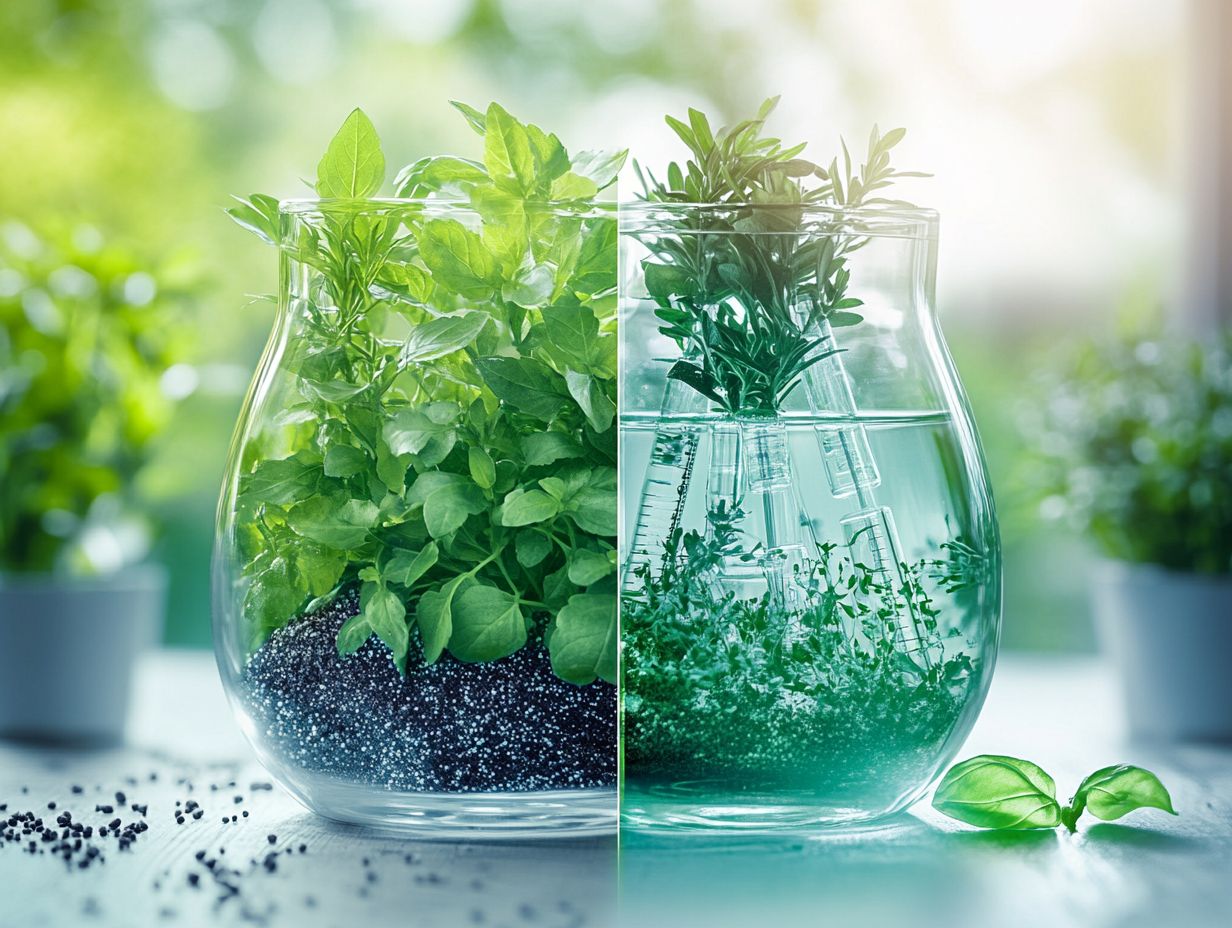
Selecting the right nutrients is vital for cultivating cannabis plants successfully. Consider various factors to ensure effective nutrient management.
Choose nutrient solutions tailored to your cannabis varieties and their growth stages. Maintaining the right nutrient ratios is essential for optimal absorption.
Factors to Consider
When selecting nutrients, consider the type of hydroponic setup you’re using and the specific needs of your cannabis plants. These factors help you manage nutrients effectively and promote optimal growth.
Evaluate climate conditions, as temperature and humidity significantly influence nutrient uptake. Remember that seedlings and flowering plants require different nutrient formulations.
When assessing nutrient brands, look at their overall composition and how well they provide essential elements. Soil tests and expert consultations can help you make informed decisions.
Emphasizing sustainable practices like choosing organic options contributes to healthier plants and an eco-friendly approach.
Tips for Proper Nutrient Management
Effective nutrient management is key to the successful growth of cannabis in hydroponic systems. It ensures plants receive the right nutrients at the right time.
Implement strategies to enhance nutrient absorption while monitoring environmental factors, like pH levels and water quality, that impact nutrient availability.
Best Practices for Optimal Plant Growth
For optimal growth in hydroponic cannabis, effective nutrient management is vital. This includes timing your nutrient feedings and closely monitoring solutions to meet your plants’ needs at different growth stages.
Regularly testing your nutrient solutions is fundamental. It allows you to adjust your fertilization strategies based on your plants’ immediate requirements. This includes maintaining ideal pH levels, which significantly influence nutrient absorption and overall plant health.
Keeping detailed records of nutrient applications helps you track growth patterns. This enables tailored adjustments to the varieties that thrive in your setup. By being adaptable to the diverse genetic traits of cannabis strains, you can fine-tune your nutrient management strategies. This ultimately enhances growth and maximizes your yield potential.
Frequently Asked Questions
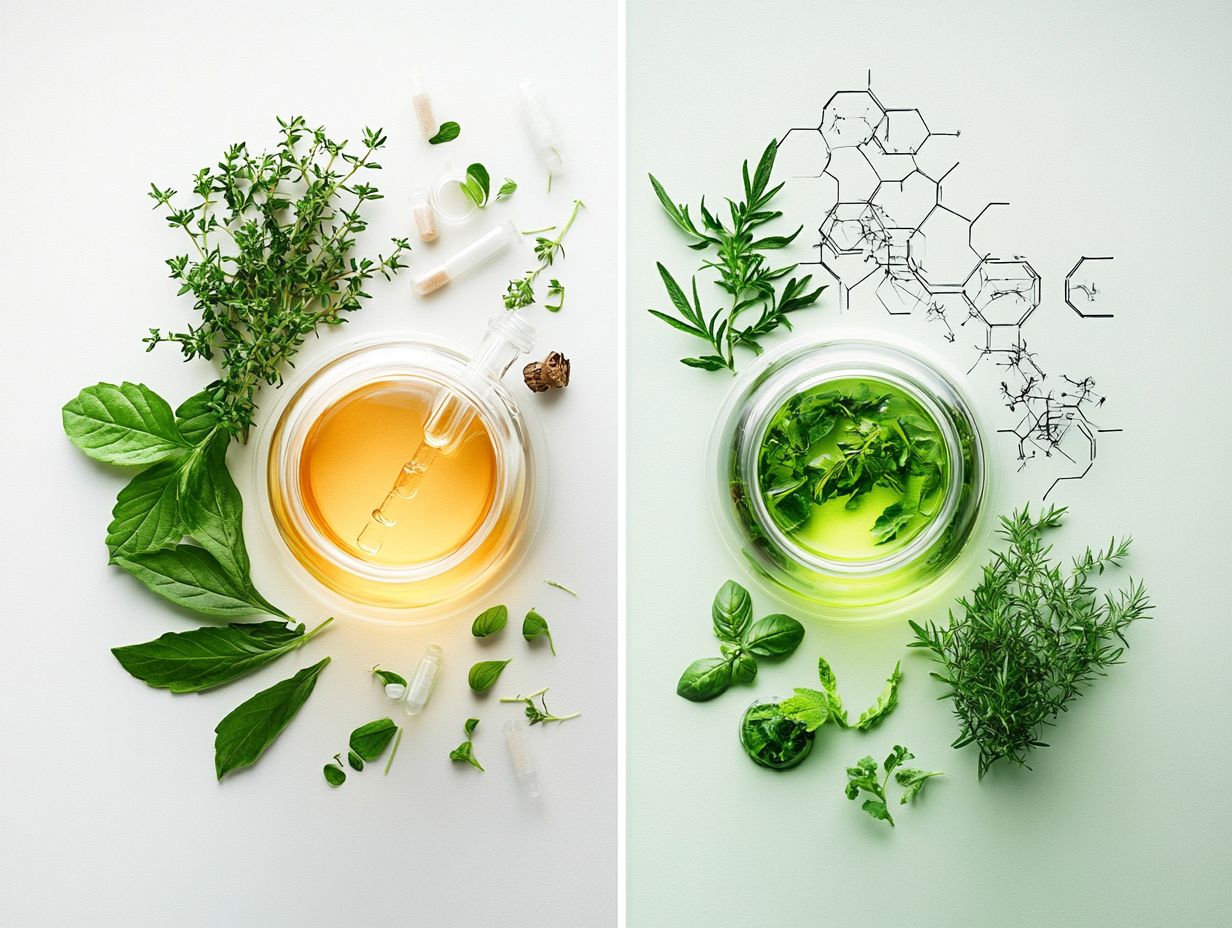
What are hydroponic nutrients and why are they important?
Hydroponic nutrients are essential elements added to a hydroponic system that provide plants with necessary nutrients for growth. They are important because, in a hydroponic system, plants do not have access to soil and must rely on these nutrients for their growth.
What is the difference between organic and synthetic hydroponic nutrients?
Organic hydroponic nutrients come from natural sources such as compost, manure, and plant matter. In contrast, synthetic hydroponic nutrients are made from chemical compounds in a laboratory.
Which is better for hydroponic systems – organic or synthetic nutrients?
Both organic and synthetic nutrients have pros and cons. Organic nutrients are often more sustainable and environmentally friendly, while synthetic nutrients can be more precisely formulated and yield faster results. Ultimately, the choice depends on the grower’s needs and preferences.
Are organic hydroponic nutrients more expensive than synthetic ones?
Generally, organic nutrients are more expensive than synthetic ones because they require more resources and time to produce. However, the long-term benefits of using organic nutrients, such as improved soil health and reduced chemical runoff, may outweigh the initial cost.
Can I use both organic and synthetic hydroponic nutrients in my system?
Yes, you can use a combination of organic and synthetic nutrients in a hydroponic system. This hybrid approach can provide the benefits of both types. However, it is important to carefully monitor nutrient levels to avoid overfeeding your plants.
Are there any specific plants that do better with organic or synthetic nutrients?
Not necessarily. Both types of nutrients can work well for various plants. However, some plants may have specific nutrient requirements better met with one type over the other. Make sure to research your plants’ needs to discover the best nutrients for them!

